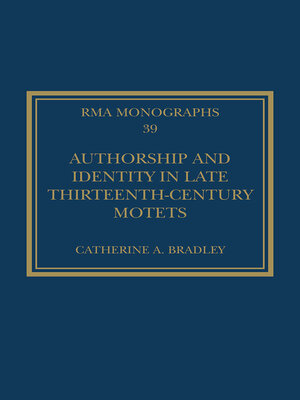Authorship and Identity in Late Thirteenth-Century Motets
ebook ∣ Royal Musical Association Monographs
By Catherine A. Bradley

Sign up to save your library
With an OverDrive account, you can save your favorite libraries for at-a-glance information about availability. Find out more about OverDrive accounts.
Find this title in Libby, the library reading app by OverDrive.



Search for a digital library with this title
Title found at these libraries:
| Loading... |
Questions of authorship are central to the late thirteenth-century motet repertoire represented by the seventh section or fascicle of the Montpellier Codex (Montpellier, Bibliothèque interuniversitaire, Section de médecine, H. 196, hereafter Mo). Mo does not explicitly attribute any of its compositions, but theoretical sources name Petrus de Cruce as the composer of the two motets that open fascicle 7, and three later motets in this fascicle are elsewhere ascribed to Adam de la Halle. This monograph reveals a musical and textual quotation of Adam's Aucun se sont loe incipit at the outset of Petrus's Aucun ont trouve triplum, and it explores various invocations of Adam and Petrus – their works and techniques – within further anonymous compositions. Authorship is additionally considered from the perspective of two new types of motets especially prevalent in fascicle 7: motets that name musicians, as well as those based on vernacular song or instrumental melodies, some of which are identified by the names of their creators. This book offers new insights into the musical, poetic, and curatorial reception of thirteenth-century composers' works in their own time. It uncovers, beneath the surface of an anonymous motet book, unsuspected interactions between authors and traces of compositional identities.






